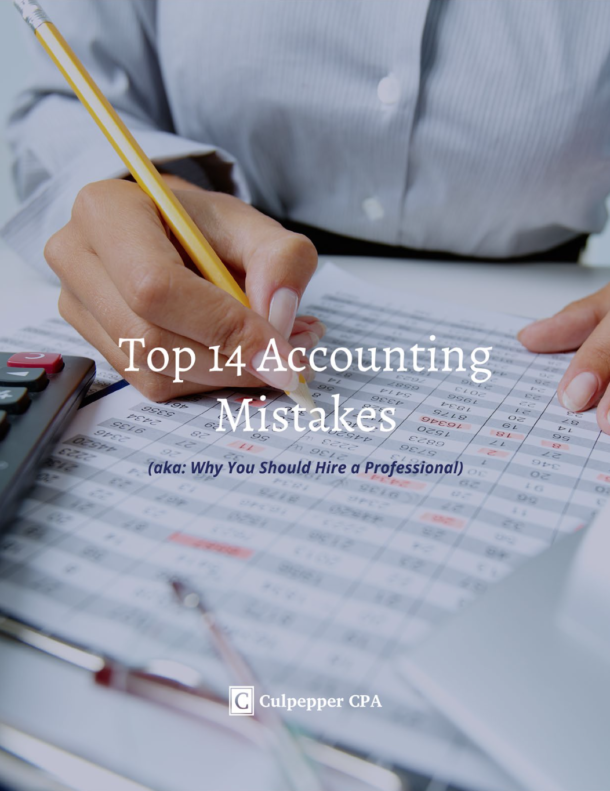At Culpepper CPA we find ourselves working often with new business owners, many of whom are self-employed for the first time.
As you can imagine, we field many questions about self-employment tax, estimated tax payment penalties, and the transition from W2 income to 1099 income.
From a tax standpoint, starting a new business or becoming an independent contractor doesn’t have to be complicated. But if you’re unfamiliar with self-employment tax, how it is calculated, and its overall effect on taxes owed, then keep reading.
This post will demystify self-employment tax and tell you what you need to do as a business owner to get on a good tax footing.
What is self-employment income?
Let’s start with a simple definition. Self-employment income refers to business earnings and any deductions associated with that revenue.
One nuance that confuses many people is this: You may have deductions for personal income that aren’t part of your self-employment income calculation. Uncle Sam recognizes you and your business as separate entities, and different tax rules apply to different entities.
For example, you can deduct interest paid on your mortgage. But unless you work from home AND have a home office, your mortgage isn’t tied to your self-employment income.
In fact, you could have zero taxable income as an individual yet still have self-employment income.
Why is that? Certain personal expenses you simply cannot deduct from your business income.
Keep in mind, however, that self-employment tax will be calculated based on business income only. Taxes on any other income will be assessed according to the rules for that type of income.
What is self-employment tax?
Self-employment tax is Social Security and Medicare, tax with which you are already familiar.
When you are an employee, your employer will typically withhold half of those two taxes from each paycheck. You pay 50%, and your employee pays the other 50%.
New business owners and newly independent contractors experience some confusion because they never knew there were two halves. They have never before had to pony up the full 100%.
Yet, when you become both the employer and the employee—and on top of that none of the Social Security or Medicare was withheld each paycheck—then the realization that you must pay the full 100% really stings. It can even seem unfair.
The truth is, someone was always paying those taxes on your behalf.
You must focus on the upside: As a business owner, you get to keep any profit left over after you pay expenses and taxes. Most employees don’t pay 100% of Social Security and Medicare, but neither do they reap the extra cash benefits from a really successful year.
Why is understanding self-employment tax important?
Business owners can rack up a huge tax liability because they weren’t setting aside self-employment tax throughout the year.
On top of a higher tax liability and higher tax rate than what they were accustomed to as employees, business owners can also get hit with penalties for not paying in quarterly estimated tax payments (in lieu of the W2 withholding mentioned earlier).
It seems obvious, but it’s worth stating: In order to avoid a mess, you have to start thinking like an owner, not an employee. You must face certain realities whether or not you like them:
- You are now responsible for 100% of Social Security and Medicare (also known as self-employment tax) for your self-employment income.
- You should make an estimated tax payment each quarter.
- Not making timely quarterly payments can result in penalties.
- In fact, if your income grows throughout the year, your quarterly payment should exceed the estimate from earlier in the year.
How do CPAs help?
Culpepper CPA’s bread-and-butter clients are business owners who enlist us to help them with their bookkeeping, their payroll, and their quarterly tax projections.
We use their up-to-date financial statements to determine what amount the estimated tax payment needs to be to avoid penalties. We also keep an eye on the deadlines and remind them to mail the checks.
At the very least we explain their options and empower them to make informed decisions.
In Conclusion
Self-employment tax will be assessed on any business income. Personal deductions won’t affect it.
Some people may be able to show an overall loss for income tax purposes, yet they may still have self-employment tax liability because personal deductions don’t offset self-employment income.
Hopefully, you’ve got the gist now, and we’ll be happy to provide more information. Just shoot us a message using this Contact form: https://culpepper-cpa.com/contact/.


